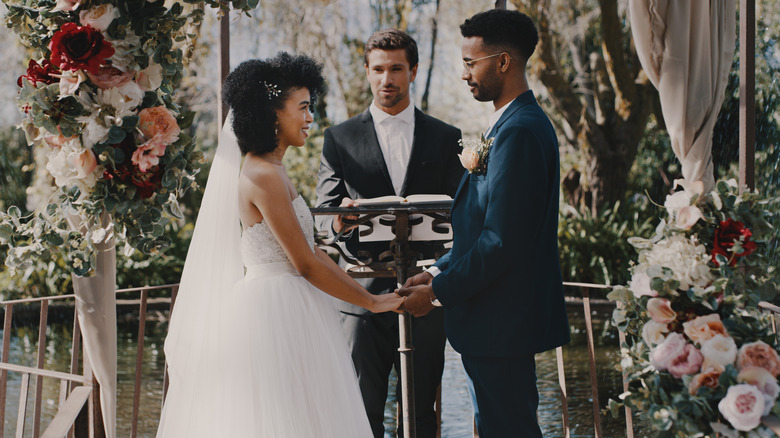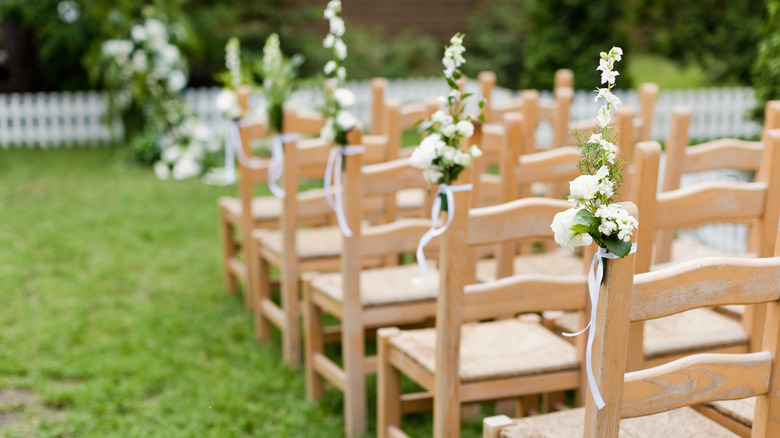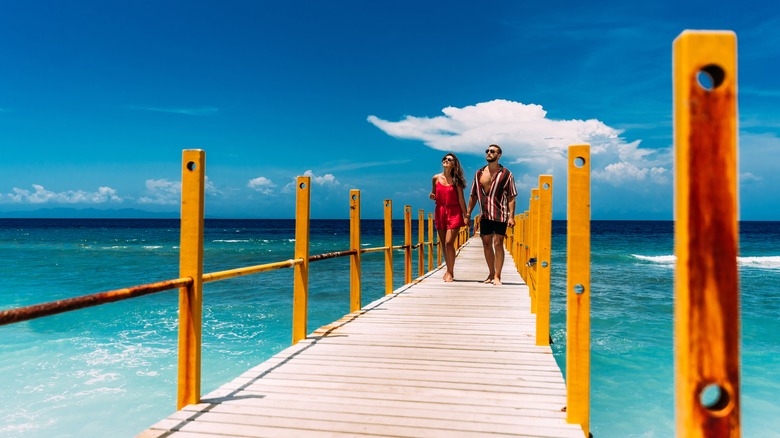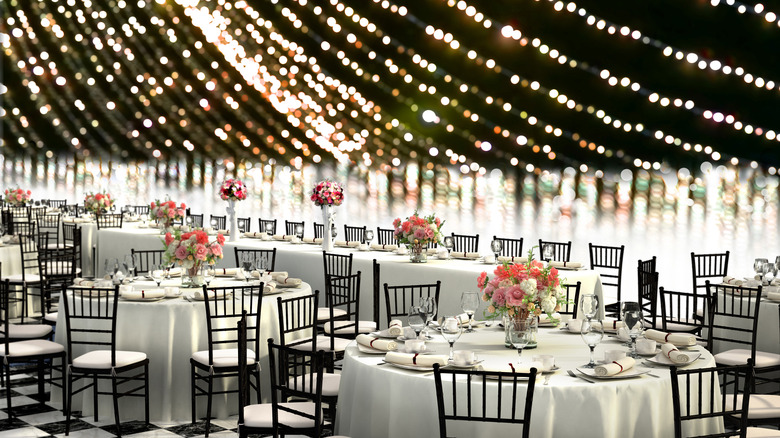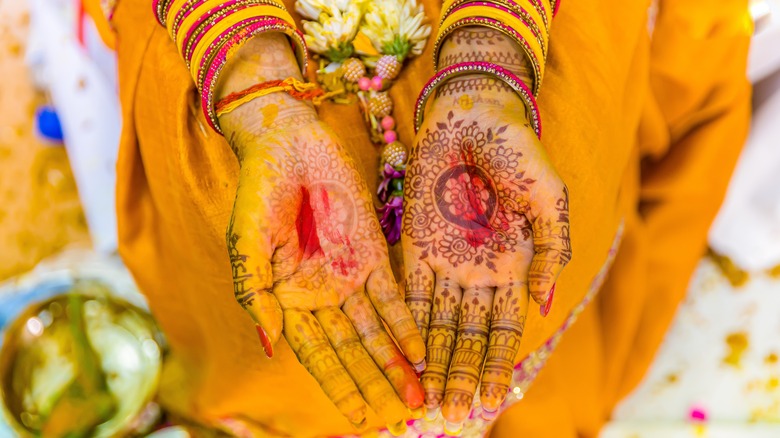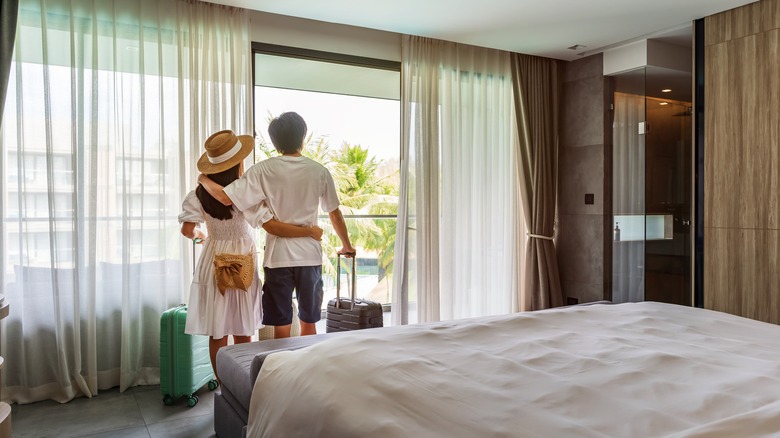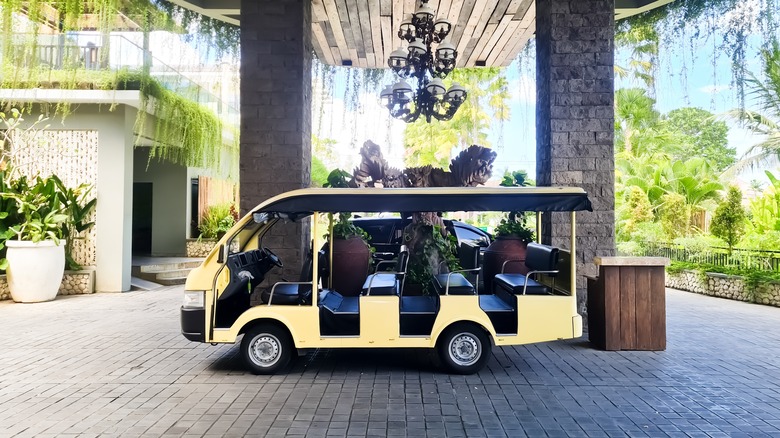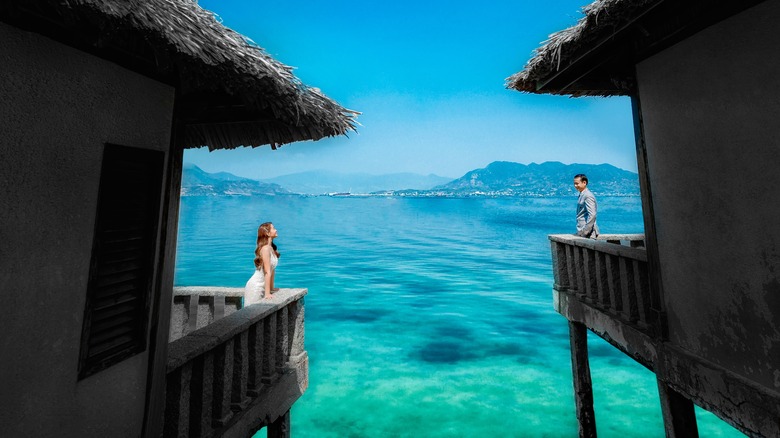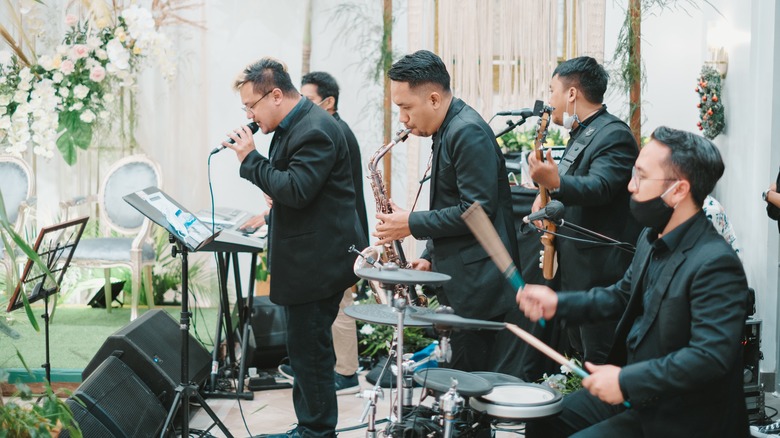Tips For Choosing The Perfect Venue For Your Destination Wedding
Throughout our lives, a few moments stand out. Think of graduating from high school or college or getting your first job. Another watershed event is a wedding, an episode saturated in joy and unity by its very nature. Many duos want everything to be perfect on this day and will make every effort to ensure it is. Since the occasion will hopefully only take place once, couples often experience extra pressure to ensure getting hitched takes place without any hitches. Perhaps the biggest decision of them all — certainly the one with the most repercussions — is choosing the right venue.
Some pairs will decide to host the wedding close to home, but others like to take the experience up a notch and pick a spot far away, like a destination wedding in Europe. These weddings add the exciting element of a vacation to the familiar rituals and tropes of a union. While this sounds like a winning combination, it requires meticulous preparation and thought. We've picked apart the process of finding the perfect venue for your destination wedding to make planning for that special day a little easier.
Fine-tune the guest list
The guest list might have the greatest influence on where you can hold your wedding. Organizing a destination wedding, like any wedding, involves dealing with a relentless barrage of moving parts and infinite calculations. Knowing how many people will attend will significantly shape where you can hold the wedding. If you want hundreds of people at the ceremony, you may need to choose a venue close to home. Holding a wedding far away is, in a way, a method of editing the list and curating who will show up. After all, a destination wedding often requires guests to take a flight, which will increase travel costs and mean fewer individuals will have the financial means to come than if you held it in a local spot.
Once you have a total number of guests to work with, you can proceed to assess your budget and decide where you can afford to hold a destination wedding with that many people attending. This might also be a time to reconsider the idea of a gift registry. It's a lot to ask people to fly a long distance for you and also expect them to buy you a wedding gift. However, the decision ultimately rests with you. If you opt to forego the gift registry, make a note of this in the wedding invitation.
Visualize the look and feel of the wedding
Everyone has an image of how they want their wedding to look, of how the ceremony should appear and feel. Perhaps a super formal theme, with the bride in a pristine white dress and the groom in a morning suit or tailcoat? You'll exchange vows in a church with high ceilings and ornate stained-glass windows. Or maybe something a little more relaxed, held in a park or an outdoor venue with everyone barefoot and folksy music as the soundtrack? Narrowing down the exact details of the ceremony is critical when choosing a venue for a destination wedding.
Sit down and really spend time thinking about the kind of ceremony you want. Have you always dreamed of getting married on a beach, with palm trees swaying nearby and clear, calm, turquoise waters lapping at the shore just behind? If so, then maybe you should forgo Canada. Alternatively, do you dream of having the event near woods painted in the glorious, blazing hues of fall? Then you certainly won't want to hold it in Mexico. Essentially, you need to match the look to a suitable place where you can achieve your desired aesthetic. That might seem obvious, but it's worth repeating.
Forecast the forecast
After you've come to a consensus on the visual aspect of the wedding, your next decision will be when you want to hold it. September and October, for instance, are gorgeous months in many parts of the world — some believe they number among the best months for visiting Europe. In the Caribbean, though, September and October fall slap bang in the core of hurricane season. With wildly unpredictable weather, it may not be the best time of the year for your beach wedding, but that doesn't mean you can't have a wedding in the Caribbean during this annual weather episode. However, you might have to compromise on the specifics at the destination venue.
The choice might come down to whether you want an outdoor versus indoor venue, which could wholly depend on the weather and the time of the year you plan for. You might always have dreamt of a summer beach wedding in Mexico, with everyone really dressed up, for example. But did you consider that it's the hottest time of the year in certain parts of the country, and having everyone decked out in formal clothing in the sweltering sun will feel like torture? In that case, think about switching the ceremony to an indoor, air-conditioned setting, though still in Mexico. Or hold the ceremony early in the morning or late in the evening when the heat is less fierce.
Find a venue with experience
Many of us have visited hotels and resorts that have managed to cast a spell on us. That could be because of the food, the location, or the climate; it might be due to the warm staff or a combination of them all. You might think back on one of these places and feel it would be a perfect or fitting place to hold the wedding, especially if it has special significance for you and your spouse-to-be. But before you let your heart take control of your head, think carefully about your choice. If the property has no track record of holding weddings, you may be heading for disaster.
At the least, you might find yourself doing a lot of the leg work and organization. That could entail everything from arranging the seating for the ceremony and reception to dealing with the caterers, florists, entertainers, and so much more. It's always important to find a venue with plenty of experience holding a wedding. For starters, look for properties with a wedding tab on their homepage. Some tourism boards, like Aruba or Tahiti Tourism, can provide a handy list of properties adept at hosting such special occasions. When it comes to getting your wedding done right, experience trumps emotion.
Choreograph the proceedings
While the ceremony will be the main attraction, it's not the only component of a destination wedding. You may wish to add ancillary events, from rehearsal dinners to informal drinks and maybe even some fun side activities. There's usually a reception after the wedding and perhaps a relaxed get-together the following day. Hindu weddings, for instance, can take multiple days, with aspects like the "haldi" (a purification ceremony) and "sangeet" (a function that involves singing and music) before the main wedding.
Whatever you decide on the structure of the whole extravaganza, it's crucial to check in advance whether the venue can handle all of these events. If it can't, you'll need to find somewhere nearby that can, though this will create more logistical concerns. While some guests will be happy to do their own things outside the wedding functions, it's worth offering suggestions or planning activities for the down periods. If the venue is by an ocean or lake, you could arrange group water sports, like a kayaking excursion. With a city destination wedding venue, a walking tour can be an exciting adventure for first-time visitors.
Map out a budget
Along with the guest list, your budget might be the most important factor in terms of what is and isn't possible when scouting a destination wedding venue. Setting a top limit on the amount you can spend on the wedding will influence many facets of the decision. From the distance you can travel to the type of resort or venue you can afford, the budget really has the final say. As is evident by now, a lot of variables will influence the final product of the destination wedding. And all those variables add up, effortlessly chipping away at the money pile set aside for the occasion.
The finances, once settled, will govern whether you can hold your dream tropical wedding, for example, in Tahiti, or whether you will have to choose Tampa. There are a lot of items to consider when thinking about a budget. Some parts of the Caribbean are cheaper than others — for instance, Barbados and Curaçao are pricier than Jamaica and the Dominican Republic. Sticking with a domestic destination might prove even more cost-effective, as some guests (and even the couple) might be able to drive there. However, this might increase guest numbers, which will up the cost.
Block rooms early
Once you've finalized your choice of venue and made a deposit, you'll need to find accommodations for your guests. It's crucial to block rooms at the hotel or resort (if that's where you'll hold the wedding) or somewhere close to the venue as soon as possible. Sure, you can leave guests to fend for themselves and expect them to make their way to each day's events on their own steam, but that could leave them feeling frazzled.
Many guests will opt to stay in the same property where the wedding will take place or close to the venue if it's elsewhere. That will allow them to get to events with great ease, and that's what you want: to make the destination wedding as convenient and painless as possible. Hotels usually can reserve rooms about one year in advance, and couples should work with the hotel sales team to arrange this. The earlier you make the block, the better — there will be more availability, and you might be able to negotiate a lower room rate. If you plan to have your honeymoon in the same location as the wedding, arrange the dates for your room accordingly. That said, you don't have to take your honeymoon right after the wedding.
Factor in transportation requirements
It's key to visit the potential destination to iron out the kinks and check the suitability of the place for the event. You'll want to look at aspects like entry requirements, vendors, and the location of the venue within the destination. Think about how far you want the venue from the airport and how easy it is to get there. You might yearn for a beach wedding on the Pacific coast of Costa Rica, a country with good surf resorts, but if the place you plan on choosing is a four-hour drive from the nearest airport, does it really make sense? You might be willing to suck up the inconvenience yourself, but will all your guests, especially the older individuals and any kids?
Arranging everyone's transportation from the airport to the venue and at the destination is definitely something that you should help to plan. Seemingly straightforward steps like organizing shuttles between the airport and the resort and thinking about how guests can get around once they arrive will go a long way. Some guests will prefer to be independent and make their own arrangements for lodging, dining, and transportation. But for others, you will be the guiding light, so choosing a venue that makes this less of a burden will pay dividends.
Inclusive or exclusive
Large resorts, like some of the best all-inclusives in the Caribbean for adults only, regularly host destination weddings. They have the facilities, space, venues, and staff that make these types of events a routine part of their daily operations. Knowing you will have plenty of options for accommodations, locations to hold the ceremony and the other events, and activities for guests to do in their downtime is an advantage of choosing a large resort. But having a destination wedding at one of these accommodations comes with drawbacks. Outside the wedding events, everyone attending might feel like another hotel guest. With other non-wedding travelers staying at the property, that sense of unity and camaraderie within the wedding group can get lost.
Instead of holding the wedding at a resort with hundreds of rooms, you can choose to go more exclusive and opt for a small property. This choice will feel markedly more intimate than a large sprawling resort but could also have trade-offs. You might need to book out the entire property, which some smaller hotels insist on when hosting a wedding, and this can be pricey. With a smaller property, you will likely have less flexibility on available dates and perhaps fewer choices of places to hold the ceremony. But the feeling that the hotel is exclusively at the disposal of you and your wedding guests is priceless.
Check the local rules
Like in the U.S., each country has its own rules and laws that govern everything from littering to the legal limit for blood alcohol content allowed when driving. These regulations also extend to the wedding and what is permitted or possible and what is not. For example, if you want a destination wedding with a religious ceremony in the Caribbean, will the island you choose allow it? If so, will you be able to find someone who can conduct that religious ceremony, or will you have to bring them with you? Will the resort where you stay and want to hold the wedding let you host a religious ceremony, or will you need to choose an outside venue? These are all very real questions that you will need to answer well ahead of time to ensure everything goes smoothly.
Some places allow you to get married within a day of arriving, like Jamaica, a destination with great beach resorts, whereas, in the islands of the Turks & Caicos, visitors will need to arrive a few days before the ceremony. Some countries don't allow same-sex marriages. If you need to spend an extended period of time at the destination before the wedding, stay at a cheaper resort in the run-up and switch to the actual resort closer to the date, as it will help with the budgeting.
Keep track of inclusions
Couples who want to think as little as possible about the intricacies of all the planning for their destination wedding might look for a resort or venue that offers an all-inclusive structure. In this scenario, the package will fold in the cost of everything — rooms, catering, flowers, the ceremony, and more. These packages certainly take the stress out of keeping track of all the minutiae, diving into the nitty gritty of each and every item, and tallying it all up at the end.
What is included in this kind of set-up varies from resort to resort, and if you really want an accurate accounting of the final cost, it's critical that you find out exactly what is covered and what isn't. If you plan to use the venue minimally and only for specific ceremonies or functions, the all-inclusive model doesn't make sense. In this case, it's better to go a la carte and pay just for the events you want to hold at the venue.
Expect the unexpected
Destination weddings will always come with extra expenses you didn't foresee, ranging from small aspects like tips for the staff to larger issues such as having to make contingency plans because of unexpected weather. You could safeguard for this by choosing an all-inclusive plan with the resort that covers everything, but such an option could be expensive, and ultimately, you might pay for something to safeguard against a calamity that never happens.
In addition to these extras, you'll also want to clarify multiple factors. Do you want to bring in your own caterers, make-up artists, band, or DJ? Using outside vendors might increase the costs compared with hiring someone on-site, but at least you'll know what to expect from them. However, not all venues will allow this. Some resorts or hotels will insist that the property's own kitchens supply all food at a destination wedding, or they may not have the infrastructure to host an outside band.
Work with a wedding planner and travel agent
Reading about all the potential pitfalls of a destination wedding can certainly feel overwhelming, especially if you and your betrothed plan to shoulder the burden of the plans on your own. In that case, a smart option is to hire the services of a wedding planner, a professional whose job is to track and fine-tune all the details and make sure the day runs like a well-oiled machine. You can work with a planner where you live or at your destination, and they can help to arrange many of these items. If you work with one near your home, they might have suggestions for a destination wedding venue that will meet your budget, guest list numbers, and atmosphere.
Another option is to use online sites, like Destify, that can hold your hand from planning to completion. It's also wise to use a travel agent and refer all your guests to that agent. From coordinating the itineraries and flight combinations to keeping track of everyone's travel schedule, an agent will be able to make sense of the logistics. Having a travel agent for a destination wedding is key and will free up time so you can concentrate on the big day ahead.
